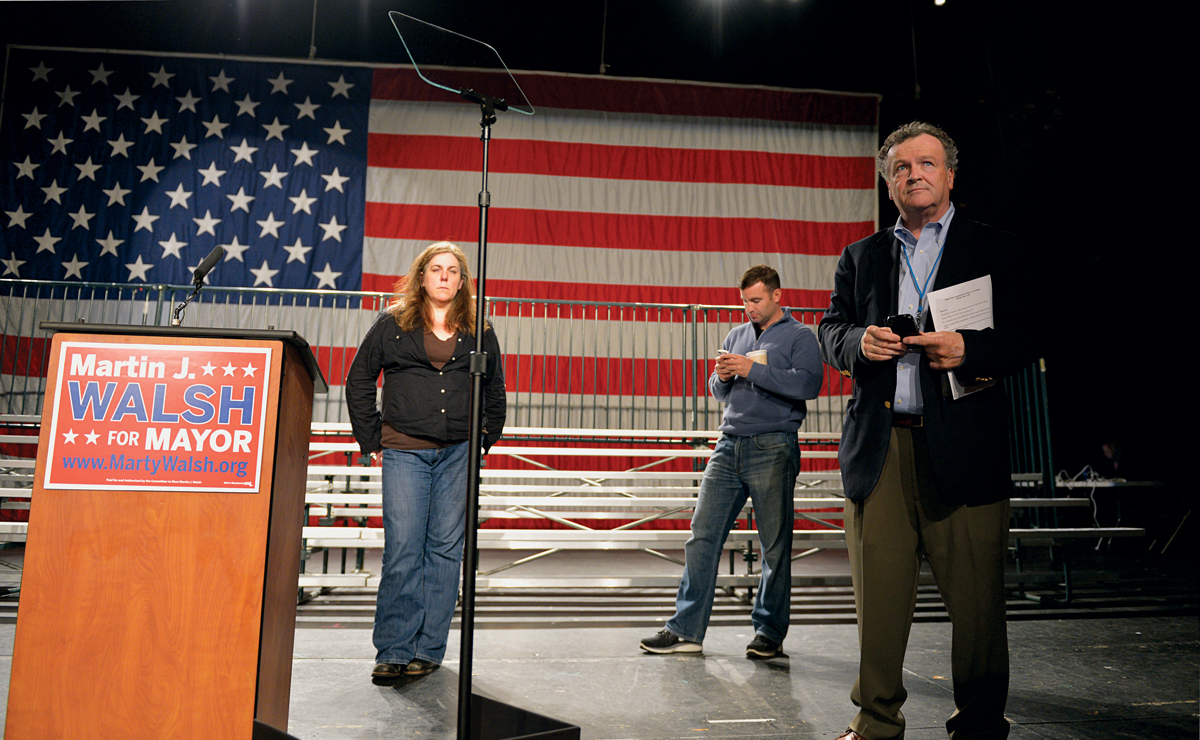Joyce Linehan: The Decider

American Bandstand: During the 2013 mayoral race, Linehan (left) was never far from Marty Walsh’s side. (Photograph by Paul Marotta)
Just after four o’clock on a blistering June afternoon, Joyce Linehan—punk-rock veteran, pit-bull advocate, proud Dorchester native, and close confidant of one of the leading candidates for mayor of Boston—stood in the middle of the street and realized she was about to die.
As a Volvo took a blind left out of the Pat’s Pizza parking lot and bore down on her, she froze. “As I stood there in the middle of Dot. Ave.,” she later recalled, “and bracing for the impact to my legs, what flashed through my mind? Not ‘Oh my God, who will take care of Charlie if I’m hurt?’ or ‘Oh my God, how will I pay my bills if I can’t work?’ Nope. It was ‘Oh my God, the campaign!’”
Charlie Ashmont, her 10-year-old rescue pit bull, needn’t have worried. Linehan managed to walk away from the accident—the teen behind the wheel of the Volvo seemed almost as shaken as she—but on that day, her candidate, Marty Walsh, realized that if Joyce had gone, his mayoral hopes might have gone with her. “I told him the story,” Linehan wrote on her blog, “and he told me I cannot, under any circumstances, get hit by a car before the election.”
Until recently, Linehan was best known as a publicist for some of Boston’s top nonprofit arts organizations, among them ArtsEmerson, First Night Boston, and the Institute of Contemporary Art. If you were on the receiving end of her pitches—as I was for many years as an arts editor at the Boston Phoenix—you knew that she had already lived a wild, tumultuous rock ’n’ roll life. In the 1990s, her Dorchester home served as the East Coast offices of the storied grunge label Sub Pop, where Linehan worked as a promotions director and talent scout. Over the years, Hole’s Courtney Love and Pearl Jam’s Eddie Vedder were among the hundreds who hung out at her legendary pad. But starting in 2000, Linehan pivoted between arts and politics, transforming a network of cultural movers and shakers into a powerful new constituency that seems poised to transform the city. I wanted to see how she did it, so I spent several months trailing Linehan as she oversaw Marty Walsh’s bare-knuckled campaign to defeat John Connolly. (She’s now heading up the transition team that will carry the mayor-elect into office this month.)
Though she never had an official title in Walsh’s campaign, she was indispensable to it. “In today’s Globe I am referred to as a ‘political consultant,’” she wrote on her Facebook page back in late August. “They might as well have called me a lawyer or a serial killer.” In June, Walsh described her as “senior adviser, and sometimes a conscience.” I once asked Elizabeth Warren about Linehan’s role in her 2012 U.S. Senate campaign. “She was everywhere and did everything,” Warren told me. “Is there a special name for a role like that?” Linehan’s friends refer to her, simply, as “the decider.”
It’s still difficult to pin down exactly what kind of political animal Linehan wants to be. Sometimes she comes across more like an obsessive fan than a political operative. When we sat in her kitchen last June, she told me she has no interest in political office; she says she has never been paid for her political work and does not want to be. “I mean, define ‘pay,’” she said. “I do it so that the place that I live in is better.” And yet occasionally, couched in the passive-aggressive language of a humble brag, she will let slip hints of deeper ambitions. “To dispel any rumors,” Linehan wrote on her Facebook page on October 18, “I have no desire to be the arts commissioner if Marty wins.” She added, “I want to be the police commissioner. But Marty said no.”
“Excuse the dog smell,” Linehan said as we climbed into her Subaru Forester in Dorchester’s bustling Peabody Square. A few minutes later, we pulled into the driveway of an 1880 quasi-Victorian house that Linehan’s friends have dubbed “Ashmonticello.” When she bought the 4,200-square-foot home, in 2012, she gutted and renovated the interior with guests in mind. The driveway, Linehan points out, can accommodate “at least” two tour buses; the top floor now houses a recording studio. In September, as the mayor’s race heated up, members of the band Scud Mountain Boys rehearsed there for a tour. The most important feature of the renovation is an expanded living room, which can accommodate up to 150 people. Which is key, because Linehan’s living room—once a mecca for indie rockers touring through Boston—is now arguably the most important living room in Massachusetts grassroots politics.
Ashmonticello is a larger version of Linehan’s old place, on Burt Street, which the Phoenix once called the “most famous and best-loved rock-and-roll crash pad in Boston history.” Bikini Kill, Smashing Pumpkins, Elliott Smith, the Jesus Lizard, and Stereolab all stayed there over the years. But Ashmonticello is also a portal between Linehan’s many worlds: the tight-knit, hardscrabble Dorchester where she was raised; the cosmopolitan salon of Boston’s nonprofit arts; and the scruffy universe of what one frequent guest to Linehan’s house calls “a real oasis in the desert of low-level indie-rock touring.”

